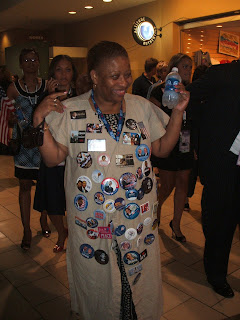Some women won’t vote this year because – why, exactly? We have carpool duties? We have to get to work? Our vote doesn’t matter? It’s raining?
Read this story and maybe you’ll change your mind:
The women were innocent and defenseless. And by the end of the night, they were barely alive.
Forty prison guards wielding clubs and their warden’s blessing went on a rampage against the 33 helpless wrongly convicted of “obstructing sidewalk traffic.” They beat Lucy Burn, chained her hands to the cell bars above her head and left her hanging for the night, bleeding and gasping for air. They hurled Dora Lewis into a dark cell, smashed her head against an iron bed and knocked her out cold. Her cellmate, Alice Cosu, thought Lewis was dead and suffered a heart attack. Additional affidavits describe the guard grabbing, dragging, beating, choking, slamming, pinching, twisting and kicking the women.
Thus unfolded the “Night of Terror” on November 15, 1917, when the warden at the Occoquan Workhouse in Virginia ordered his guards to teach a lesson to the suffragists imprisoned there because they dared to picket Woodrow Wilson’s White House for the right to vote.
For weeks, the women’s only water come from an open pail. Their food – all of it colorless slops – was infested with worms. When one of the leaders, Alice Paul, embarked on a hunger strike, they tied her to a chair, forced a tube down her throat and poured liquid into her until she vomited. She was tortured like this for four weeks until word was smuggled out to the press.
It is jarring to think Woodrow Wilson and his cronies tried to persuade a psychiatrist to declare Alice Paul insane so that she could be permanently institutionalized. And it is inspiring to watch the doctor refuse. Alice Paul was strong, he said, and brave. That didn’t make her crazy.
The doctor admonished the men: “Courage in women is often mistaken for insanity.”
What would those women think of the way women today use – or don’t use – their right to vote?
August 18 was the 88th Anniversary of the ratification of the 19th Amendment to the United States Constitution. It’s time to consider how far US women have come in the last 88 years, and how much farther we have to go.
WIPP is proud to be releasing The Economic Blueprint, the Women Business Owners’ Platform for Growth, at the Republican and Democratic Conventions (and in Washington, DC to Congress on September 9th). The Blueprint, comprised of research derived from WIPP members and members of its Coalition Partners over the last year, will provide a clear roadmap for Congress and the New Administration of the policy needs and objectives in the coming years.
We are especially proud of the Blueprint because it is has been created with no corporate funds, and is being supported by the many women business owners who have agreed to sign onto the Blueprint as sponsors.






